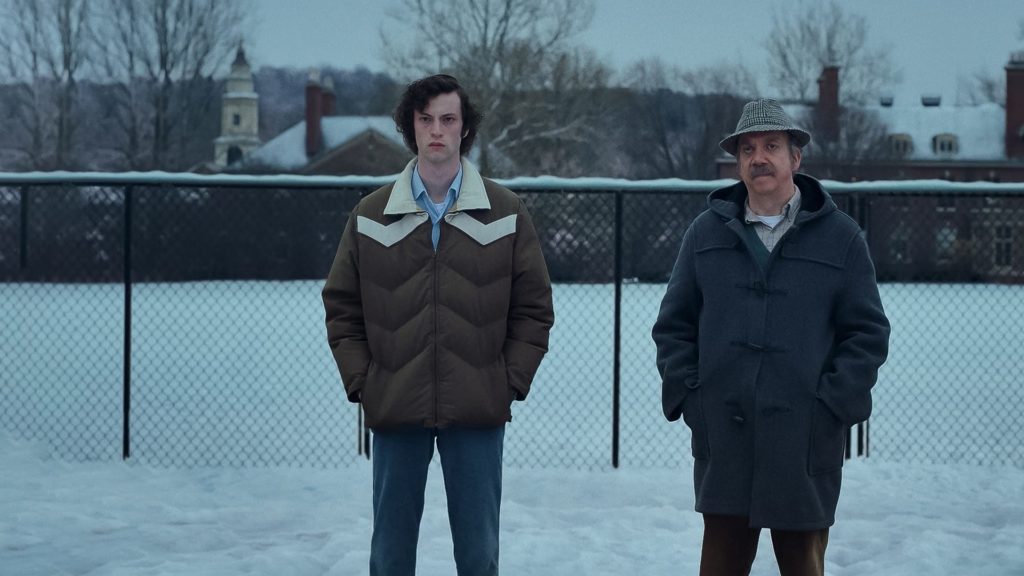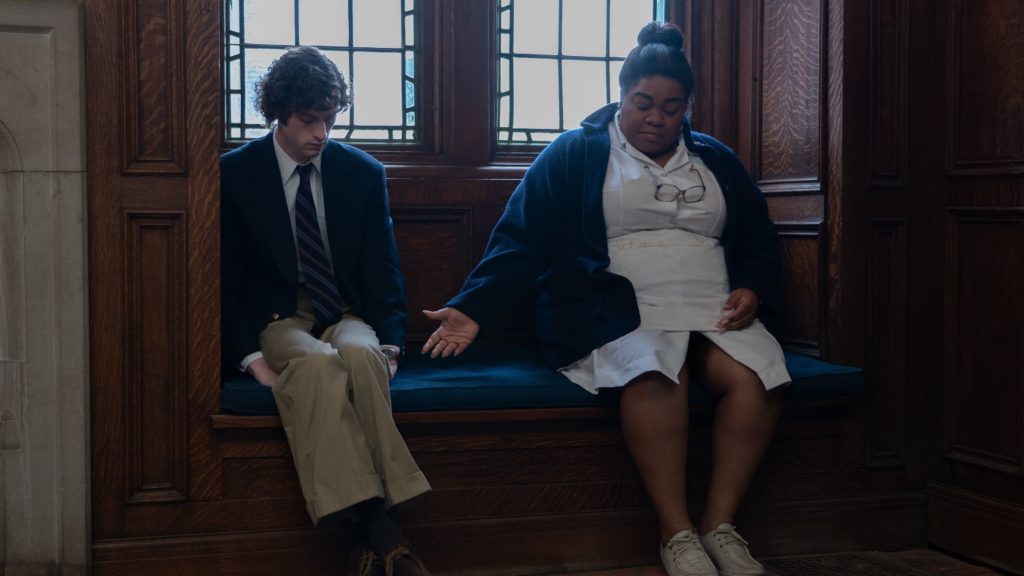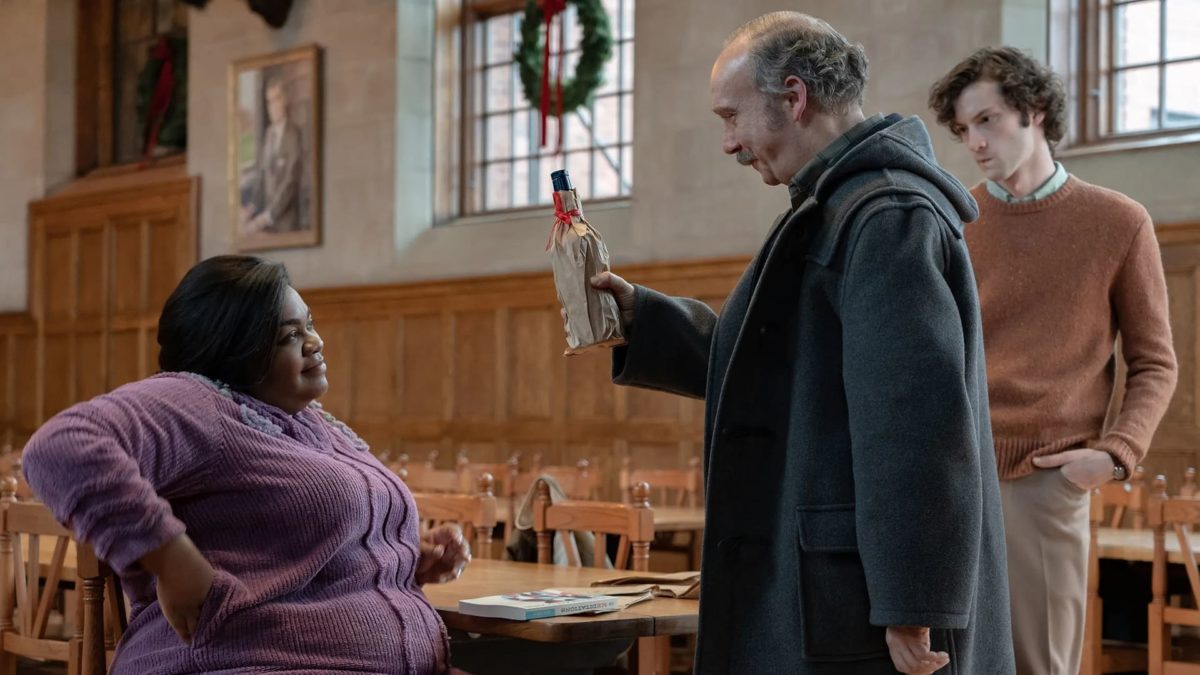History is not simply the study of the past; it is an explanation of the present
It would be reductive to say that The Holdovers works because Alexander Payne once again cast Paul Giamatti, the perfect vessel of his writing in Sideways. It also wouldn’t be entirely wrong. No one better embodies the exact strengths of Payne’s bittersweet style than Giamatti, who was born to read these lines. Giamatti’s turn as Paul Hunham is one of the most entertaining performances of the year and the anchor for this film: Existentially lonely, mostly pathetic, flickers of quiet nobility, and — most crucially — deeply hilarious.
It is just one part of an extremely satisfying and spirited whole. For the first time in almost two decades, Payne’s film is one he was clearly excited about making, with vision and purpose: a vintage-style dramedy the types of which used to be box office gold but have since been relegated to the Sundance circuit and streaming fodder.
In particular, Payne is aggressively channeling the aesthetics of early 1970s cinema with grain, noise, color grade, and composition style (much of which was added and tinkered with in post-production; this was shot digitally). Reviewers are citing Hal Ashby as an obvious inspiration, though I confess to not having seen any of Ashby’s films. The opening title cards give 1971 as the film’s year (the same year Ashby released Harold and Maude). Nonetheless, I find the film’s story and tone to be a bit later in style, after the biting “New Hollywood” crested and cinema turned a bit more optimistic. Though The Holdovers is filled with sadness and defeat, it’s ultimately a life-affirming and optimistic work; not always kind to its characters on a scene-by-scene basis, but ultimately generous and forward-looking.

The story follows the winter break at all-boys boarding school Barton Academy where Hunham teaches as a strict, old-fashioned English teacher. A group of students who aren’t able to return home during the break for one reason or another — holdovers, they’re called — have to kill time at the school while supervised by Hunham. The English teacher was given the gig of babysitting holdover students because he’s on the headmaster’s bad side after giving the son of a big donor a bad grade.
The quiet December gets interrupted by the arrival of the wealthy parent of one of the students. This parent offers to bring the whole group skiing, so long as the other students’ families are okay with it. Alas, Angus (Dominis Sessa) can’t get in touch with his mom to get approval for the trip, so he’s stuck by himself with Hunham and cafeteria worker Mary Lamb (Da’Vine Joy Randolph) for the Christmas break on Barton grounds while the rest of the students head off to a ski resort.
Thus begins the proper promise of the premise: a three-hander between Angus, Hunham, and Mary who are all suffering in different ways. Angus recently lost his father; Hunham is an alcoholic depressed by the mediocrity of his life; and Mary’s son died in Vietnam. Payne takes his leisurely time getting to this portion of the story: We’re around minute 45 once the film settles into its three main players. But, against my better judgment, I didn’t hate this about the film. It really lets you soak in the setting and mood of a chilly winter filled with chilly hearts as it builds.

The film’s episodes are almost universally sad but not quite tragic: A Christmas eve party where Mary gets too drunk and Hunham strikes out romantically; a hospital visit where Angus has to lie to save Hunham’s job; etc. The darkest moment occurs when Angus shares a dark truth about his family life, but even that is tempered with Hunham boosting Angus’s spirits.
The overall tenor is deeply inviting. It’s not due to one aspect of the production, but the balance and universally strong execution: The script is a bit soft near the end and could have been edited, but is filled with some terrific character development and turns of phrase. The look is nostalgic but just dingy enough to avoid feeling saccharine. The direction by Payne is strong, but moreso in its discipline and patience than any tricks (though I’ll shout out the hysterical long takes of Giamatti doing physical comedy in the name of personal fitness).
The one part of the film I’d mark as a home run is the acting. It starts with Giamatti, as mentioned, who I must repeat is just so damn good at this. I love how his character’s humiliating physical characteristics are piled on as the story progresses. He even gets an iconic, “merlot”-level one-liner delivery, this time about penis cancer.
Against all odds, Sessa nearly matches him as the charming, jaded teen with a bleeding heart barely under the surface. The rookie actor is nearly a co-lead with Giamatti and keeps up. (Sessa’s story is remarkable, too; he was a student at the school where the film was shot, walked into an audition with no professional experience, and won the part.) Randolph is currently sweeping awards as the grieving mother, and though I’d put her in third place, she’s quite good. Her awards candidacy benefits from a few “Oscar reel” type scenes.

Mary is a character I struggled with throughout the film, though. Race has never been Payne’s strongest topic (see: Downsizing), and Mary serves primarily as thematic counterweight to Hunham and Angus, especially how her main role is to motivate both to persist in their dreams. It borders on a cliche, but Randolph’s presence is strong enough to keep the character afloat.
The Holdovers is possibly easy to overrate, and perhaps just as easy to underrate. On the one hand, its nostalgic look and storytelling mode, its “they don’t make ‘em like this anymore” spirit, beg for a pat on the back. But I think it’s also easy to see a low stakes dramedy made for a broad audience, with themes and content that middle schoolers will appreciate just as much as Oscar Death Race cinephiles, and miss just how well-crafted and pleasing it is. It’s one of my favorite movies of 2023, one of Payne’s best movies period, and a film I plan to regularly schedule in my holiday movie nights.
- Review Series: Alexander Payne
Is It Good?
Very Good (6/8)
Awards, Honors, & Rankings
- Alexander Payne Films Ranked - #3
- The B.A.D.S. (2023) - Best Actor (Paul Giamatti) (Winner)
- The B.A.D.S. (2023) - Best Screenplay (Nominee)
- The B.A.D.S. (2023) - Best Cinematography (Nominee)
- The B.A.D.S. (2023) - Best Supporting Actor (Dominic Sessa) (Nominee)
- The B.A.D.S. (2023) - Best Picture (Nominee)
Dan is the founder and head critic of The Goods. Follow Dan on Letterboxd. Join the Discord for updates and discussion.

